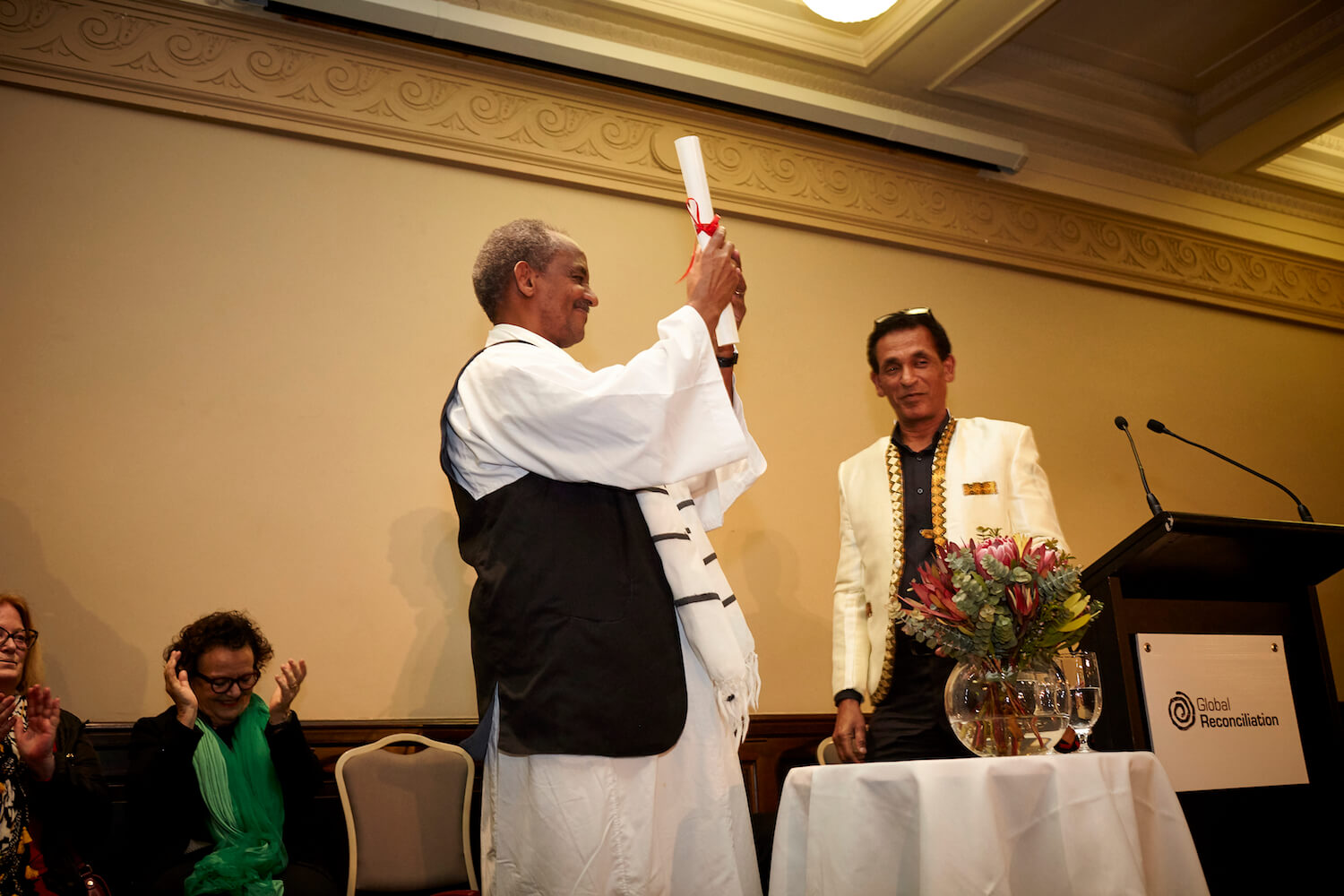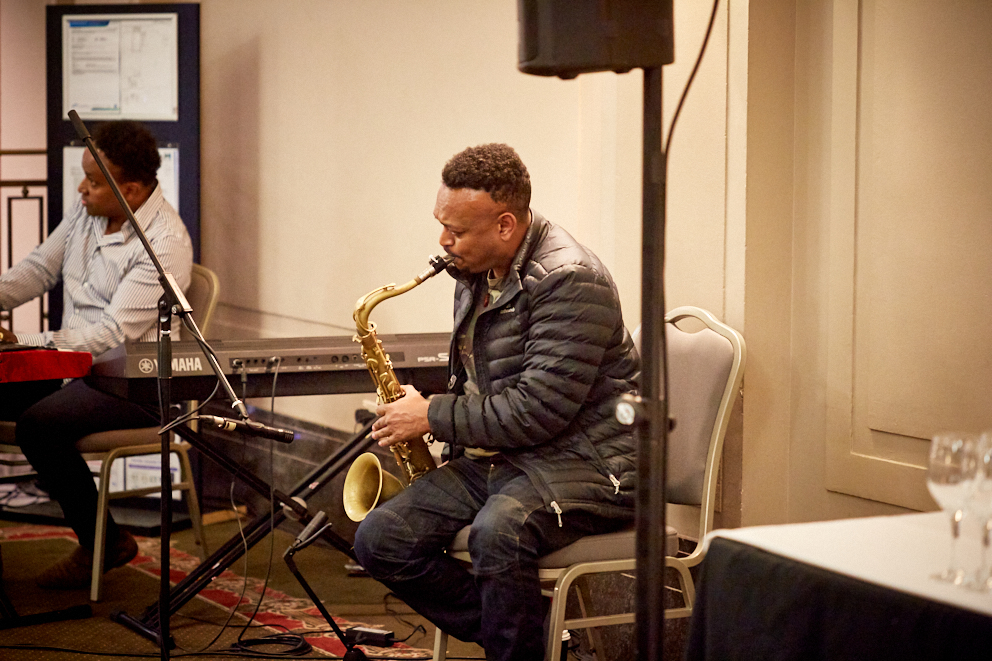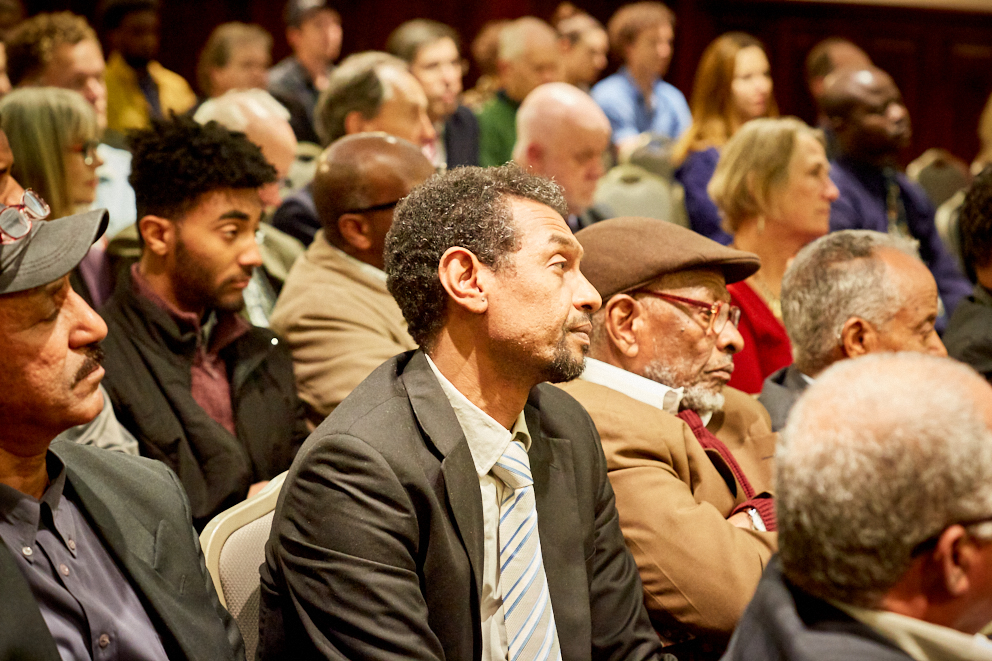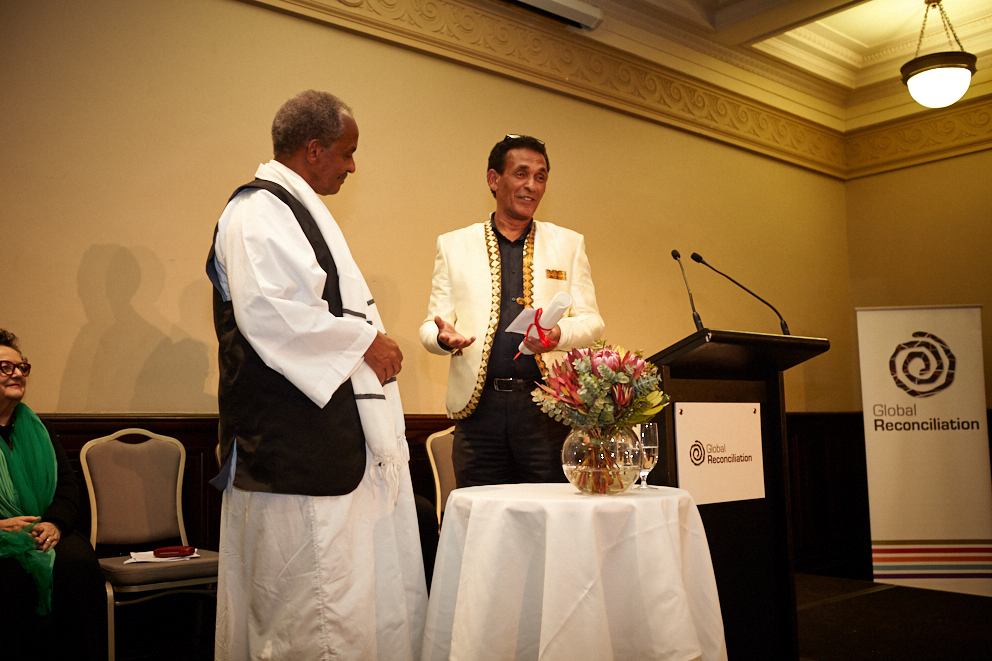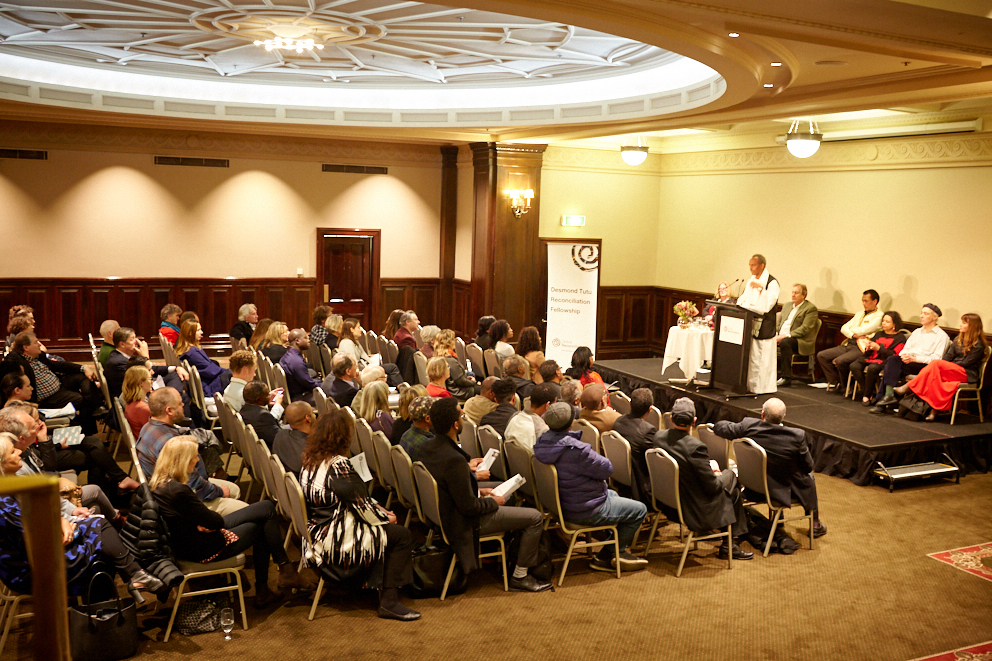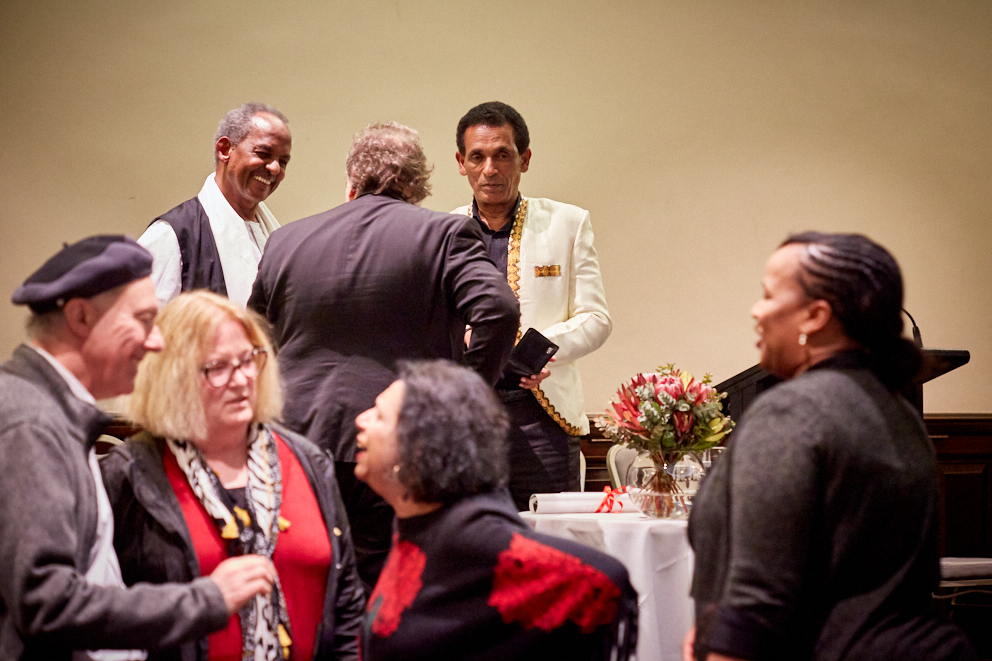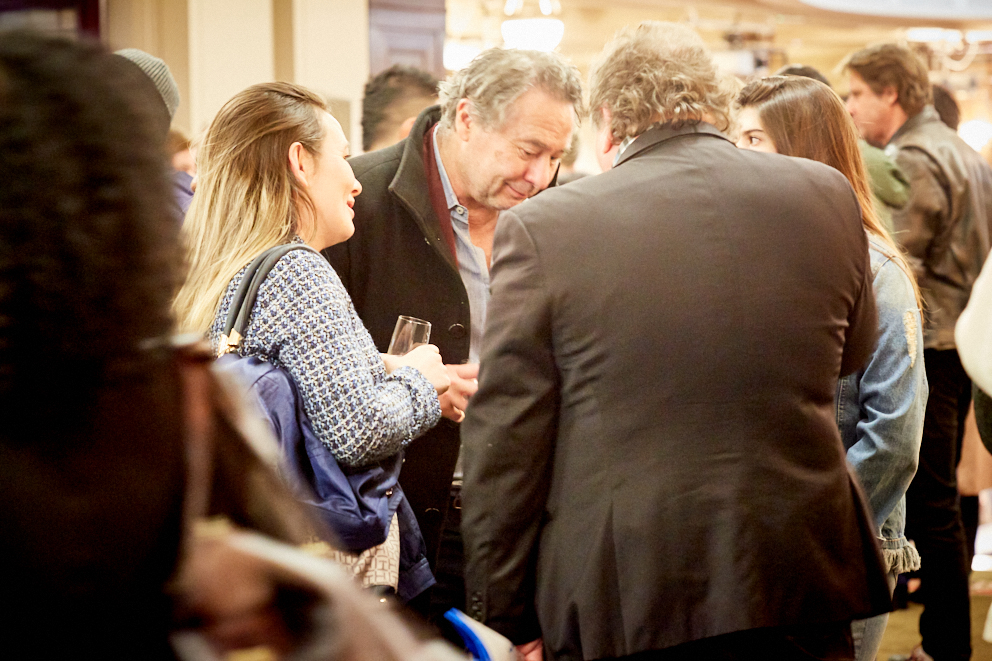Zeremariam Fre: After climbing a great hill, one only finds that there are more hills to climb (extract)
Dr Zeremariam Fre receives Desmond Tutu Reconciliation Fellowship award at Melbourne Town Hall, 4 October 2018.
Dr Zeremariam Fre's acceptance speech at the 2018 Desmond Tutu Reconciliation Fellowship award was tremendously inspiring. Dr Berhan Ahmed, 2009 Victorian Australian of the Year, lovingly presented the award to Dr Fre for his extraordinary work in significantly advancing both the need for ecological care and the practices associated with it. Dr Fre has provided practical leadership in caring for, protecting and restoring the natural environment, and helped to develop innovative responses to contemporary environmental challenges.
Relive the moment and read on for highlights of his speech below:
“I feel greatly honoured and humbled to receive the prestigious Desmond Tutu Reconciliation Award for environmental care acknowledging my lifelong dedication and my colleagues’ at Pastoral and Environmental Network across the Horn and East Africa (PENHA). We pride ourselves in being an African-led and African-inspired regional NGO that’s collectively fighting for 30 years for the livelihood dignity and environmental protection of millions of pastoral peoples across the Horn of Africa.
Personally, in all my struggles in leading an organization like PENHA for 27 years in a very turbulent region, Bishop Desmond Tutu has been a great inspiration and role model in showing the way in dealing with your own wounds as the first great step towards a genuine a broader reconciliation within wider humanity. If I can be truthful to myself, our Horn region lacks the likes of Bishop Desmond Tutu and Nelson Mandela. Great leaders are yet to be born in our region. I hope an award like this will inspire the next generation of leaders in our continent.
On behalf of myself, the pastoral communities I represent and so many of my colleagues in Africa and internationally, I would like to thank the DTRF board of trustees and dedicated volunteers staff and volunteers who manage such a dedicated organization. Last but not least, I would like to greatly acknowledge my comrade wife Biri Tesfaldet for her great support and solidarity during all my struggles in setting up PENHA.”
About the Horn of Africa and myself
“The Horn of Africa is the centre of many past and present civilizations, including Judaism, Christian and Islamic civilizations, with literature, architecture, arts, languages and has a long history of communities who share common borders, ethnic affiliations and common resources. As someone born and bred in that region with great beliefs in pan-Africanism, I always had a great interest in our common heritage, not our differences, and my childhood in Eritrea had inspired my later life when dealing with pastoralist issue in our region and globally.
Allow me to take you along my childhood memory lane in Keren, Western Eritrea. Our town had a mixture of the Eritrean ethnic group but also included Yemenis, Somalis, Sudanese, Ethiopians, Italians, West Africans, and Armenians. There were a mosque and synagogue side-by-side, and Black Madonna annually venerated by Muslims and Christians. Those early life experiences shaped my later life.
But in my adult lifetime, the Horn of Africa Region as I knew it had its share of disasters including political instability, all sorts of conflicts, lack of good governance, huge internal/external displacement of huge populations, environmental challenges, food insecurity, and a lack of peace over the last 40 years which has been in the global media limelight and has tarnished its image. The region is also cursed by its strategic location, which attracts a multiplicity of regional and global actors who are driven by broader strategic motives which created more insecurity. For example, many of the high and low-intensity conflicts and the insecurity caused by them created more instability, the vulnerability of livelihoods and the inability of pastoralist communities to manage their natural resources as they have always done.”
Why a lifelong dedication for pastoralist and environmental care in Africa and globally?
“I was a former Eritrean refugee who benefited from a higher education in the UK in Agriculture during the early eighties. After finishing my studies in 1989, I had a vision for establishing the first African-led regional NGO and named it the Pastoral and Environmental Network in the Horn of Africa (PENHA). We operated from bases in all the Horn countries and our core mission was to:
Promote/advocate pastoralism as a sustainable livelihood and challenge the prevailing misconceptions, such as this type of livelihood being backwards and environmentally unsustainable.
Help the establishment of self-managing pastoralist grass root organizations to fight for their land and other civil rights.
Generate relevant information on environmental resource management and the socio-economic contribution of pastoralism to local, national and regional economies.
Promoting legislation at a government level, for example, to secure pastoralist land rights (Ethiopian Federal Constitution 1996).
Capacity building support for staff within various levels at government ministries for planning projects in the pastoral area.
Bring various actors together to seek common solutions for key issues facing pastoral peoples across the Horn region regarding environmental protection and solidarity (African Union Framework on pastoralism 2012).
As I conclude my acceptance speech for this tremendous award, with great humility and honour on behalf of pastoral peoples in Africa I quote one of my other famous role models Nelson Mandela, who said, ‘’After climbing a great hill, one only finds that there are more hills to climb”.”

